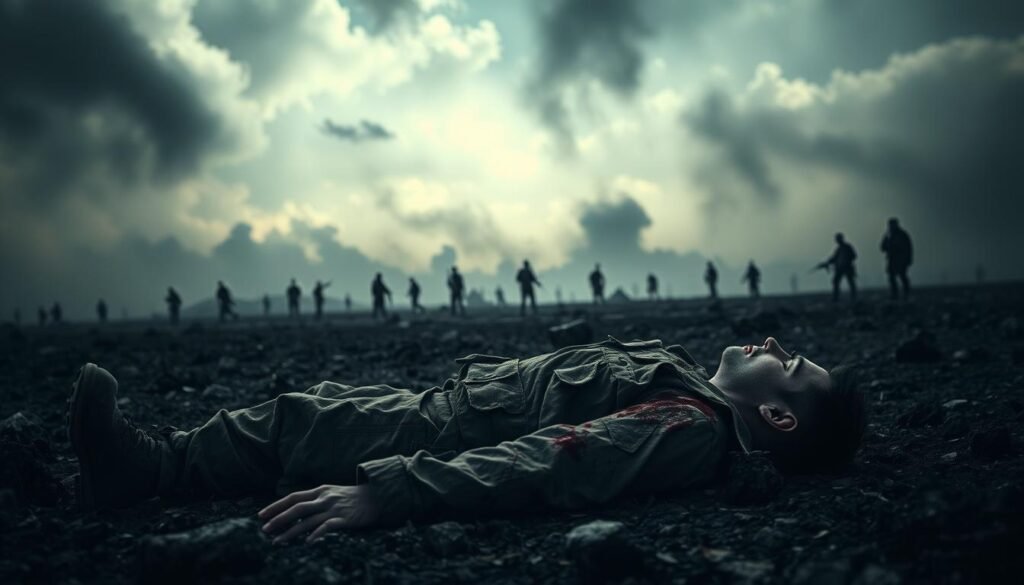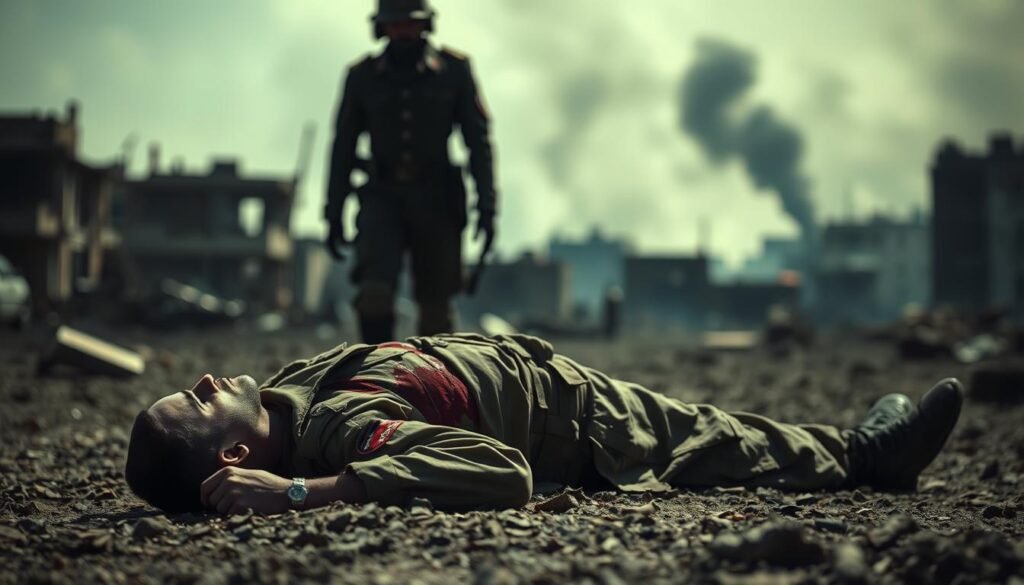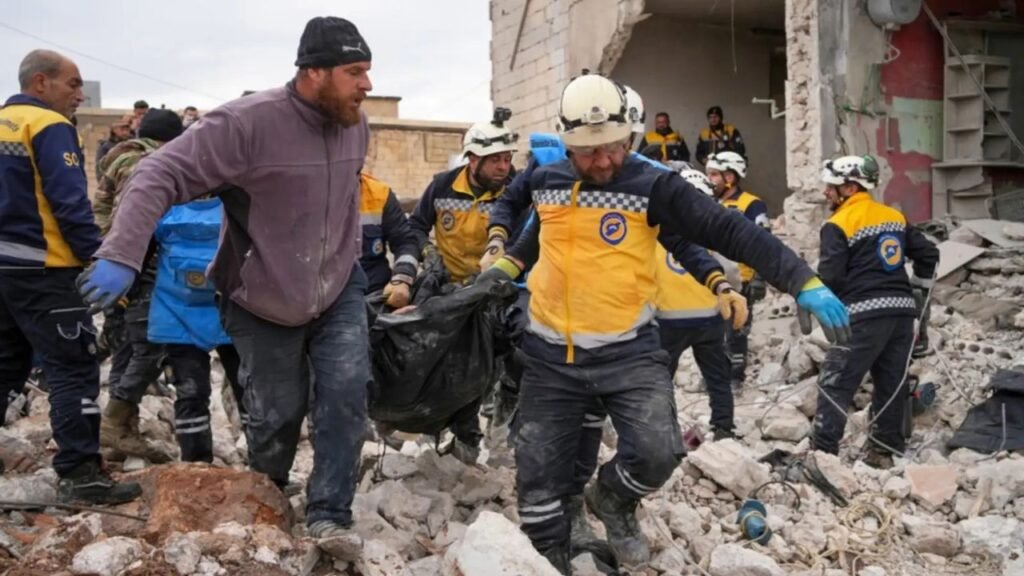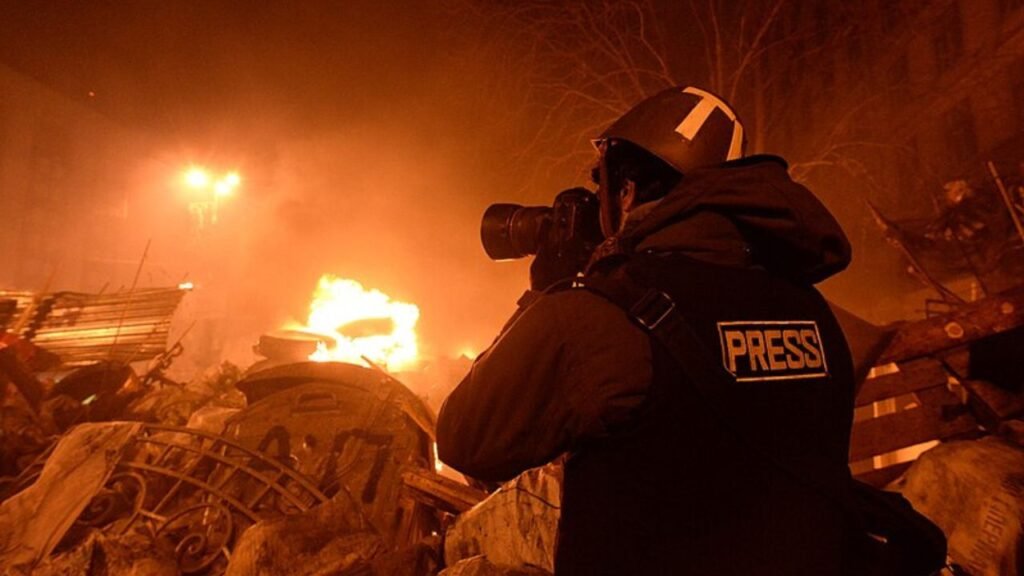Have you heard about soldiers being shot even after they’re wounded? Does this act break international law? It’s important to understand the legal and ethical sides of such actions in today’s wars.
The term war crime is clear in international law. It includes many acts that are not allowed during wars. Shooting wounded soldiers is a big concern because it might not follow these laws.
As you look into this complex topic, you’ll learn more about international law. You’ll see how it applies to these serious issues. Knowing this is key because it affects how wars are fought and protects human rights.
Contents
- 1 The Legal Framework of War Crimes
- 2 Protections for Wounded Combatants
- 3 Is It a War Crime to Shoot a Wounded Soldier?
- 4 Historical Cases and Modern Precedents
- 5 Ethical Considerations and Military Training
- 6 Training Soldiers to Adhere to International Law
- 7 Conclusion: Is Shooting a Wounded Soldier a War Crime
- 8 FAQ
- 8.1 What constitutes a war crime under international law?
- 8.2 Are wounded soldiers protected under the Geneva Conventions?
- 8.3 Can shooting a wounded soldier be justified in certain circumstances?
- 8.4 How are war crimes prosecuted under international law?
- 8.5 What role does military training play in preventing war crimes?
- 8.6 Can individuals be held accountable for war crimes?
- 8.7 What are the implications of shooting a wounded soldier under international law?
The Legal Framework of War Crimes
The Geneva Conventions and international humanitarian law are key to understanding war crimes. They set rules for war and protect non-combatants and those who can’t fight anymore.
The Geneva Conventions, created in 1949, have almost every country’s backing. They cover how to treat prisoners, protect civilians, and care for wounded fighters. International humanitarian law builds on these, offering a full guide for military actions in war.
Protections for Wounded Combatants
Wounded fighters get special care under these laws. They are not to be harmed, intimidated, or punished. You must give them medical help, no matter who they are.
Rules like distinction and proportionality also apply. This means military actions should not harm those who can’t fight anymore.
These laws stress the value of human life and dignity, even in war. Knowing these laws helps us see the importance of caring for wounded soldiers and the rules for military actions. [Is Shooting a Wounded Soldier a War Crime?]
International humanitarian law keeps changing with modern warfare. It’s important to keep up with new rules and interpretations. This ensures we follow the principles of humanity.
Is It a War Crime to Shoot a Wounded Soldier?
Many wonder if shooting a wounded soldier breaks the laws of war. These laws are key to international humanitarian law. They guide how armed conflicts are fought, including how to treat wounded soldiers.
The rule of protecting wounded soldiers is a main part of IHL. The Geneva Conventions and their Additional Protocols are at the heart of this law. They stress the need to protect those who can’t fight anymore because they’re hurt or sick.

Many cases and precedents help us understand how to treat wounded combatants. For example, the Geneva Conventions clearly say it’s wrong to harm people who are no longer fighting.
- The First Geneva Convention protects wounded and sick soldiers in armed conflicts. [Is Shooting a Wounded Soldier a War Crime?]
- Article 3 common to the Geneva Conventions sets out fundamental humanitarian principles, including the prohibition of violence against persons taking no active part in hostilities.
- The Additional Protocols to the Geneva Conventions further clarify the protection afforded to wounded combatants.
History and today’s cases have tested these rules. For instance, in World War II, trials were held about the bad treatment of prisoners of war and wounded soldiers. These trials set important legal examples.
| Case | Description | Outcome |
|---|---|---|
| World War II Trials | Mistreatment of POWs and wounded soldiers | Established legal precedents for war crimes |
| ICTY Cases | Prosecution for violations of IHL | Clarified the application of IHL to wounded combatants |
In summary, shooting a wounded soldier is a big crime under the laws of war. The legal rules, backed by case law and precedents, show how vital it is to protect those who can’t fight anymore.
Historical Cases and Modern Precedents
Exploring military ethics shows us how key historical cases and modern precedents are. They help us understand how we treat wounded soldiers today. These cases show us how our views have changed over time.
History is full of examples where wounded soldiers were shot or killed. World War II is a prime example. The actions of soldiers and leaders back then are still studied today. They set important rules for how armies should act now.
Today, the way we treat wounded soldiers is still a big issue. Wars in Iraq and Afghanistan have shown us how important it is to follow international law. These examples teach us about the importance of training and conduct in the military.
Looking at both old and new cases, we see a push for better treatment of wounded soldiers. As laws change, armies worldwide are updating their rules and training. This shows a commitment to following humanitarian law.
Understanding these cases is key to getting the full picture of military ethics and war laws. By studying these examples, we learn about the challenges of military actions. We also see the efforts to protect human rights in war zones.
Ethical Considerations and Military Training
Exploring military conduct shows that ethics are key in soldier training. How soldiers deal with wounded foes on the battlefield is shaped by ethics and law. This is crucial. [Is Shooting a Wounded Soldier a War Crime?]
Military ethics guide soldiers on what’s right during combat. Treating wounded soldiers is both legal and ethical. Training that focuses on international law helps soldiers know their duties and the outcomes of their actions.
Training Soldiers to Adhere to International Law
Good military training teaches soldiers about international law, like the Geneva Conventions. These laws set rules for treating wounded fighters. This knowledge helps soldiers make choices that are both right and legal.
Adding ethics to military training is more than following rules. It’s about valuing human rights and dignity, even in war. This way, military actions are not just legal but also morally correct.
See Also: Is It a War Crime to Shoot a Fleeing Enemy?
Conclusion: Is Shooting a Wounded Soldier a War Crime
You now know that shooting a wounded soldier is a serious crime under international law. It’s called a war crime. The rules are clear: soldiers are protected by the Geneva Conventions. Harming wounded soldiers is not allowed.
History and recent cases show that such actions are illegal. They also go against the basic principles of war. Military training teaches the importance of following these rules, even when it’s hard.
It’s important to understand and respect international law in military actions. This helps keep war ethical and lawful. It protects both soldiers and civilians.
FAQ
What constitutes a war crime under international law?
A war crime is a serious violation of international law. It includes acts like willful killing, torture, and inhuman treatment. This includes shooting a wounded soldier.
Are wounded soldiers protected under the Geneva Conventions?
Yes, the Geneva Conventions protect wounded soldiers. They say attacks on those who are hors de combat are not allowed. This includes those who are wounded or sick.
Can shooting a wounded soldier be justified in certain circumstances?
No, shooting a wounded soldier is generally a war crime. It’s not justified under international law. The only exception is in self-defense, and even then, it’s closely examined.
How are war crimes prosecuted under international law?
War crimes can be tried by international courts, like the International Criminal Court. They can also be tried by national courts, thanks to universal jurisdiction.
What role does military training play in preventing war crimes?
Military training is key in preventing war crimes. It teaches soldiers about the laws of war. It also stresses the importance of following international humanitarian law.
Can individuals be held accountable for war crimes?
Yes, individuals can face charges for war crimes. This includes commanders and superiors who don’t stop or punish such crimes. [Is Shooting a Wounded Soldier a War Crime?]
What are the implications of shooting a wounded soldier under international law?
Shooting a wounded soldier can have serious consequences. It can lead to war crime charges and harm a country’s reputation.

Vicente Underwood is from New Jersey, USA. He studied law and now works with his senior. In his free time, he writes blogs. Jackson is a proud father of two girls and enjoys balancing his work and family life.




